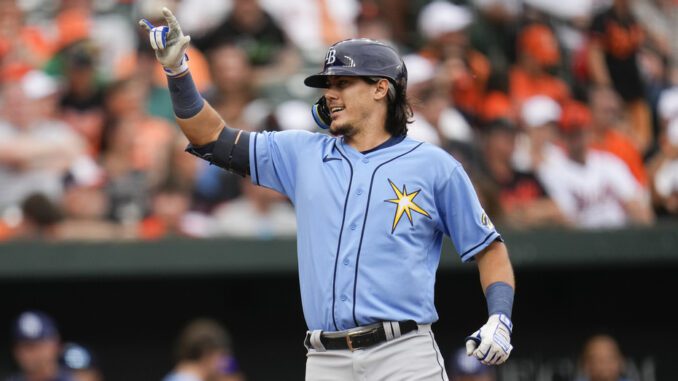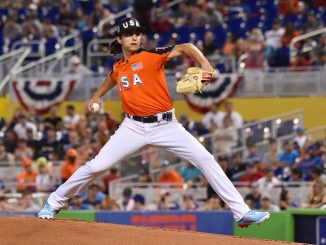
DURHAM — Baseball always seems to have a plan for its top prospects.
Those plans never seemed to include Tristan Gray.
During COVID when the minor leagues were shut down, each team got to keep 28 of its top minor leaguers in a separate site to train in case they were needed. Gray wasn’t invited. Instead, he found a job with the Sugar Land Skeeters in something called the Constellation Energy League, an independent baseball league not affiliated with organized baseball. But unlike organized baseball, they were playing during the pandemic.
During the winter months, baseball has the Arizona Fall League, where promising minor leaguers can hone their skills in the desert sun. Gray has never been invited. He spent one winter playing in Perth, Australia.
As he’s done throughout his minor league career, Gray took the slight with a positive attitude.
“I haven’t played baseball in December before in my life,” he told an Australian newspaper. “I’ve never done anything like this before. Seeing a whole other culture has definitely been eye-opening. I’ve loved it so far.”
The next winter, he worked for UPS, loading trucks for delivery. When he returned to Durham the following season, he brought his orange UPS work vest with him. The team used it as their reward for home run hitters, allowing anyone who went deep to wear the vest in the dugout for an inning.
The minor leagues are known for giving fans a glimpse of future greats — Bulls fans recall seeing Wander Franco, Josh Lowe and Shane Baz on their way up — but the vast majority of spots on minor league rosters are filled by guys like Tristan Gray. They are baseball lifers who seem to have stalled, just shy of their ultimate destination.
From the time Gray arrived in Durham at the start of the 2021 season, 37 former Bulls made their big league debuts. That includes Baz, who was chosen by Pittsburgh in the same draft as Gray but 12 rounds earlier and signed for a $4.1 million bonus. Gray’s bonus was .1 — he signed for $125,000, a nice sum to be sure, but not the kind that convinces an organization to take a closer look or give another chance.
Thirty-seven teammates. Enough to fill a team and a half’s worth of roster spots with players who were picked instead of Gray. Eight of them — Franco, Jake Hager, Esteban Quiroz, Taylor Walls, Vidal Brujan, Xavier Edwards, Osleivis Basabe and Alika Williams — played the same position as he did.
A minor league city is not a place where players with big league dreams want to put down roots, but that’s what happened to Gray. He got engaged while he was with the Bulls — the wedding is scheduled for November. The record for most home runs by a Bulls player who never played in the majors is 43. Gray hit 69.
Gray did everything the Rays asked of him. He hit in Triple-A. He hit in spring training. When they wanted him to work on defense, he did that. When they wanted him to bulk up, he did. And when they picked someone else, time and again, he kept working and kept smiling.
After six full years in the minor leagues, players get to become free agents. The logic of the rule is that six years is more than enough time for a team to make a decision on a player. If they aren’t ready to make him a big leaguer by then, he deserves the chance to find a team that might.
This is the last month of Gray’s sixth full year, which means it’s likely his last month with the Durham Bulls. With just over a week to go in the regular season, he was awakened by a phone call Saturday morning.
It was Bulls manager Michael Johns, who gave him the words he’d all but given up on hearing: Get to the airport.
Taylor Walls, one of the Bulls shortstops promoted ahead of him, was going on paternity leave. That meant there was a small window of time for which the Rays needed someone to fill in. Gray had gotten the call.
Across the country in Houston, his parents and grandmother were getting to the airport as well. They would be in Baltimore for Gray’s first day with the Tampa Bay Rays. They were the first people he called after getting off the phone with his manager.
“I said, ‘I’m going to The Show,’” he said of talking to his mother, his voice breaking with each word. “And she absolutely lost it. And my dad, I could hear him losing it in the background.”
That first night, Gray entered the game as a defensive replacement at first base in the sixth inning. He had one at-bat, popping out on the first pitch he saw. But that was enough to get him an entry in the Baseball Encyclopedia.
The story could end there and it would be a happy ending. But the Rays are in a pennant race, playing the team they were tied with atop the American League East. This wasn’t simply the organization giving him a bone on his way out the door. They needed him, and the next day he was in the starting lineup playing shortstop.
In the sixth inning, he lined a single to right field for his first major league hit. In the eighth, he came up with the score tied and hit a towering drive to the deepest part of the ballpark. It cleared the wall for a go-ahead home run.
“I couldn’t tell you anything about running around the bases,” he said.
“That was a pretty special moment,” Rays manager Kevin Cash, a former Bull himself, said. “Super pumped for him. The journey and all that, and then to come up and hit the home run in the moment — that could have been one of the biggest hits of the year for us.”
This isn’t Hollywood. Baseball still has a plan for its top prospects, and chances are they still don’t include Tristan Gray. Walls will return from paternity leave in a day or two, and Gray will likely return to the Bulls. In another week, his agent will begin shopping him to other teams as he looks for a new home next season.
He knows that. That’s why, in his postgame interview with the media, he said, “I’m going to try and make this day last as long as possible.”
But regardless of where the story goes from here, Tristan Gray will always have that page in the Baseball Encylopedia, a few spots after All-Star pitcher Sonny Gray, a few before 1950s Yankees pitcher Eli Grba.



